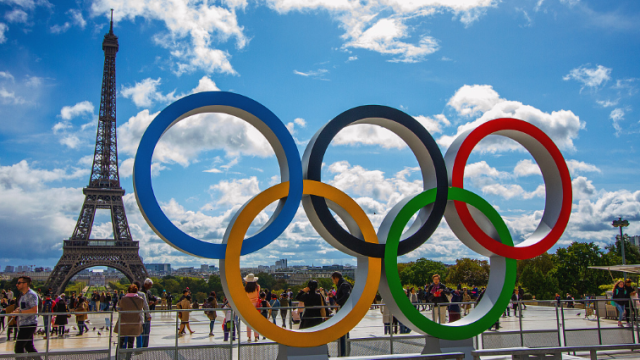In 1924, France proudly hosted the Olympic Games in Paris for the first time. A century later, the City of Lights is set to once again captivate the world with the Paris 2024 Olympic Games. This momentous event promises to be not just a pinnacle of athleticism but also a grand celebration of France’s rich cultural heritage, artistic tapestry, and enduring historical legacy. Paris 2024 will mark a groundbreaking chapter in Olympic history as the first-ever sustainable Games, aiming to reduce carbon dioxide emissions by half, utilize 95% of existing infrastructure, and prioritize maximum security. These key principles were highlighted during the press conference held at the French Embassy in Athens to unveil the vision for Paris 2024.
 The Deputy Minister of Sports, Mr. Yannis Vroutsis, who attended the event, expressed his enthusiasm for the good preparation of France and said he was happy because, as he stressed, “every successful Olympic Games, wherever in the world, is a success for Greece. We are in the country where the Olympic Games were born, where the Olympic flame is lit”.
The Deputy Minister of Sports, Mr. Yannis Vroutsis, who attended the event, expressed his enthusiasm for the good preparation of France and said he was happy because, as he stressed, “every successful Olympic Games, wherever in the world, is a success for Greece. We are in the country where the Olympic Games were born, where the Olympic flame is lit”.
The presentation, which was attended – among others – by the President of the HOC, Spyros Capralos, was opened with a speech by the French Ambassador, Laurence Auer, who referred to the cooperation with the Greek state, the economic, social and sporting value of the Games, and spoke about hospitality and the forms of the French art of living, such as music, gastronomy, art, culture and tourism.
 Atout France’s director for Greece, Italy and Switzerland, Frédéric Meier, stressed that the ambition of the coordinators of this year’s Olympic Games is to encourage people to travel and visit the whole France, not just Paris, and to attract new visitors to discover the festive side of the country.
Atout France’s director for Greece, Italy and Switzerland, Frédéric Meier, stressed that the ambition of the coordinators of this year’s Olympic Games is to encourage people to travel and visit the whole France, not just Paris, and to attract new visitors to discover the festive side of the country.
“The Olympic Games to be held in Paris have been conceived in a different way, not only to share the city’s heritage, but also to make them the first sustainable Games, with a focus on reducing carbon emissions and making the most of existing venues. The entire city of Paris is being transformed and, after the Games, visitors will re-discover it through a new lens,” he said.
Mr Meier announced the creation of the “My Paris je t’aime” app – and “My Paris je t’aime handicap” for people with disabilities – a practical tool with all the useful information for getting around Paris.
As for the Olympic Flame, the Director of the Organization said that it will depart from Greece and will arrive in France on May 8, 2024, on the historic Belem and will travel to many regions before arriving in Paris.
 The Greek Director of Planning and Coordination at Paris 2024 Olympic and Paralympic Organising Committee, Lambis Konstantinidis, referred to the biggest event in the world that brings together the greatest athletes from around the globe and offers a unique experience.
The Greek Director of Planning and Coordination at Paris 2024 Olympic and Paralympic Organising Committee, Lambis Konstantinidis, referred to the biggest event in the world that brings together the greatest athletes from around the globe and offers a unique experience.
As he said, the strengths of Paris 2024 include the combination of the value of sport with the broad global visibility of France through the largest communication platform that allows the promotion of the most important elements of the country, including the art of living.
A key feature of this year’s event
The key point of this year’s big event will be the opening ceremony of the Games, which will be held for the first time outside the stadium and specifically in the Seine, while he explained that there will be an open marathon for everyone, for athletes and amateur sports enthusiasts.
This year’s Olympic Games will therefore be “Games open to all”, with Mr Konstantinidis adding, from his office in Paris, that they will be “historic Games with equality and a neutral environmental footprint”.
“For the first time in history, we are coming out of the stadium and we will have a ceremony that will go through the centre of Paris via the Seine. All the monuments of the city will be at the disposal of these Games and so we see images such as the Stadium at the Eiffel Tower where we will have beach volleyball matches, the Grand Palais where we will have fencing and taekwondo, in the gardens of the Palace of Versailles, there will be equestrian disciplines”, he said.
On the issue of security, Konstantinidis stressed that the desire is to hold free Games and “not militarised, a real celebration,”, noting however the “unprecedented security operation”.
Prioritizing Security and Transportation Safety remains paramount for the Paris 2024 Olympic and Paralympic Games. Stringent security measures will safeguard the Olympic facilities, key city locations, and approximately 20 strategic sites across the Île-de-France region. To ensure the safety of visitors, comprehensive plans are in place to combat crime around Olympic venues, while the presence of security personnel on public transportation will be tripled.
The goal is to ensure that 100% of spectators can seamlessly access Olympic and Paralympic venues via public transportation. To achieve this, public transportation services will be expanded by 15%, dedicated bus routes will be introduced, and 5,000 staff will be stationed at stations to provide assistance. Paris 2024 will be an inclusive event, welcoming people with mobility impairments.
Over 185 kilometers of “Olympic roads” will be designated specifically for vehicles catering to individuals with disabilities. Furthermore, a dedicated public transportation system will be tailored for individuals with disabilities, particularly wheelchair users. A fleet of 150 buses will ensure smooth transportation from the eight Parisian capital stations and the Rosa Parks RER station.
Key Figures and Facts
The Olympic Games represent the pinnacle of global sporting prowess, bringing together 206 countries, 15,000 athletes (10,500 Olympians and 4,500 Paralympians), 32 Olympic sports and 22 Paralympic sports. Paris 2024 will introduce three additional sports: skateboarding, climbing, and surfing, and one more, breaking, adding a new dimension to the world of dance sport. The Games are expected to captivate an audience of 3 billion viewers worldwide.
A Spectacular Opening Ceremony
Unlike the traditional stadium-based opening ceremony, Paris 2024 will unveil its grandeur on the iconic Seine River. Stretching across a 6-kilometer span between the Bercy Bridge and the Trocadéro, this unprecedented aquatic spectacle will feature free admission zones, allowing even more spectators to experience the grandeur of the event. On July 26, 2024, the Seine will transform into a vibrant stage for the Olympic water parade, featuring 160 boats, captivating an estimated one billion viewers worldwide. Two and a half years of meticulous preparation have been dedicated to ensuring the smooth operation of this awe-inspiring event. The ceremony venue, transformed into a fortress with unparalleled security measures, will welcome an estimated 600,000 spectators, far exceeding the usual stadium capacity of 60-80,000.
Tickets:
Around 400,000 new tickets have gone on sale in the last few days, 50% of which will be under €100 and 70,000 will be sold at €24.
A total of 7.2 million tickets have been sold so far and the aim is to sell around 10 million tickets by the start of the Games.
Key points:
Paris 2024 is committed to sustainability, prioritizing the use of existing infrastructure to minimize the environmental impact associated with new construction.
Existing facilities that will be used include: • The Stade Tour Eiffel on the Champ de Mars • Les Invalides, hosting archery and para-archery events • The Stade de France, a legendary sporting venue Materials used for temporary structures will be repurposed and recycled after the Games, extending the legacy of Paris 2024 beyond sports facilities. The legacy of Paris 2024 extends beyond sports facilities, encompassing a range of transformative projects, including: • The GrandParis Express, a new metro line • The Olympic Aquatic Center • The Olympic Village • The possibility of swimming in the Seine • The revitalization of the La Chapelle neighborhood • Le Bourget, a renowned airfield • The Yves-du-Manoir stadium, hosting the 1924 Games
The Games will not be confined to the heart of Paris, extending to various locations, including: • The Palace of Versailles, hosting equestrian events • The Vélodrome National in Saint-Quentin-en-Yvelines, providing training facilities for track cycling and para-cycling events • The Vaires-sur-Marne nautical stadium, hosting rowing and para-rowing events • The Pierre Mauroy stadium in Lille, hosting the final basketball and handball matches • The Marseille marina, hosting sailing and football events For the first time, the Games will reach overseas territories with Teahupoo in Polynesia, which offers the most beautiful waves in the world for surfing.
A celebration of inclusion
For the first time, the Olympic and Paralympic athletes will come together, and both logos will merge into one emblem. These Games will be the first in the name of equality, featuring an equal number of male and female athletes. It’s remarkable considering the first modern Olympic Games organized by Pierre de Coubertin were prohibited for women! The Olympic and Paralympic Games of Paris 2024 are more than a sports event; they are an invitation to discovery, celebration, and joy. Whether you love sports, culture, gastronomy, or simply seek new experiences, Paris in 2024 is the ultimate destination.
The magazine Explore France 2023
The magazine Explore France 2023 spotlights the three Ts: Tradition, Terroir,
and Territory, emphasizing these as integral elements of the French tourist experience.
French Ambassador to Greece, Mrs. Laurence Auer, and Frédéric Meyer, Director of the French Tourism Development Agency Atout France for Italy, Switzerland, and Greece, elaborated on these key aspects in their speeches.
The magazine, themed around the three Ts, also incorporates a focus on environment and sustainability -essential elements for tourism that aims high and follows slow rhythms. Adding a feminine touch, the cover story features an interview with Cecile Debray, president of the Picasso Museum in Paris and international coordinator for the 50th anniversary events commemorating the artist’s death. Additionally, there is coverage of chef Hélène Darroze and the collaborative efforts of seven female winemakers known as “Les Fabulleuses” who have crafted a joint champagne.
Flipping through its pages, you’ll discover a plethora of cultural events and activities
scheduled throughout France in 2023. From the nature-rich Corsica and the Year of Culture in Var, to Luberon, Vignobles et Découvertes destination, Alsace, Nouvelle Aquitaine, and the Loire Valley -the magazine provides insights into diverse destinations.
Noteworthy cultural hubs include Grenoble, Besançon, Troyes, Le Havre, Serre Chevalier, and, of course, Paris, featuring innovative cultural initiatives in major museums and a significant exhibition at the Louvre showcasing the treasures of the National Museum of Capodimonte in Naples.
Embark on a sustainable exploration of France along numerous trails, whether by bike or on foot, staying at green-certified hotels and utilizing train travel.
The magazine also highlights various sporting events, including the Rugby World Cup held in ten French cities, marking its 200th anniversary.
France invites you to (re)discover its cities and regions through the lens of culture and the art of living.












